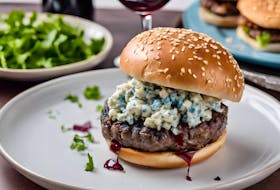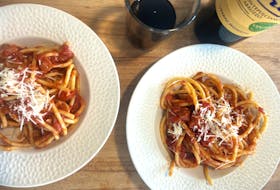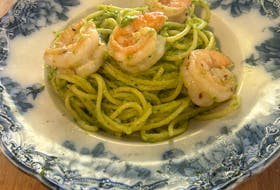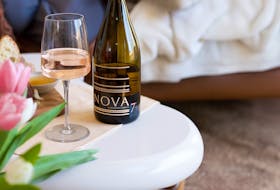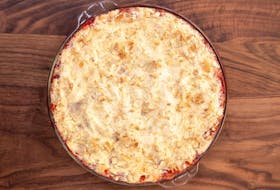Our cookbook of the week is Summer Kitchens: Recipes and Reminiscences from Every Corner of Ukraine by Olia Hercules. To try a recipe from the book, check out: Sauerkraut with whole cabbage leaves , lazy dumplings with green beans, poppy seeds and crispy shallots , and beet leaf rolls with buckwheat and mushrooms .
Fermenting, pickling and preserving vast quantities of produce in the sweltering heat takes dedication and fortitude. In Ukraine, summer kitchens — standalone buildings where the doors and windows could be flung open, and bottles and jars filled without navigating the everyday activity of a family dwelling — made it all possible.
Growing up in southern Ukraine, author Olia Hercules’s summer kitchen was made of brick. Mirroring the composition of her family’s main house, the single-room structure had a similar roof, “and a little porch and everything.” Everyone she knew who lived somewhat rurally had one. It was where people did all their summer cooking and eating, and sometimes where they prepared feasts during winter as well. Perfectly commonplace, it wasn’t until she moved to London, England that she began to realize how special they were.
“They are magical, amazing places but they’re still regular to a Ukrainian person,” says Hercules. “With the Ukrainian part of my identity, I was completely feeling they were quite unremarkable. And then when somebody said, ‘Oh my god. That sounds amazing,’ I thought, OK. I need to start researching it.”
Far from simply spaces where seasonal cooking happens, as Hercules illustrates in her third cookbook, Summer Kitchens (Weldon Owen, 2020), these structures are woven into the fabric of Ukraine’s culinary culture. Using them as a framework, she shares essays, first-person accounts and recipes spanning all seasons. Hercules “dug deep into people’s memories” for inspiration, travelling more than 10,000 kilometres, conducting interviews and visiting summer kitchens across the country.
The book’s 100 recipes tap into the past and reflect present sensibilities in fascinating ways. Summer kitchens became a tool, Hercules says, to analyze and research the very nature of her native cuisine. Highly regional — whether influenced by Nordic, Turkic or Hungarian methods — even common dishes such as holubtsi (cabbage rolls), borscht and varenyky dumplings take on local colour.
“I didn’t know how special some of the dishes we made in the south of Ukraine were. Because when I go up north or to the west and I mention some of the stuff that we make, they widen their eyes and they’re like, ‘Oh wow! Really? What’s lyok? What is this herb paste?’” says Hercules. “It’s so regional that even people from the same part of Ukraine haven’t heard of it.”
Despite these differences, Hercules sees the significance of summer kitchens and the food made within them as a unifier. The ingredients may change — dried smoked pears in the region of Poltava, fermented whole watermelons in the south, and pickled mushrooms in the north — but the techniques and traditions remain the same.
Essentially a miniature version of the main house, Hercules explains, summer kitchens go by different names depending on where you are in the country. In the north, shopa (barn), in the southwest budka (cabin) and in the south, in Hercules’s hometown of Kakhovka, litnya kuhnia (summer kitchen). As the names vary, so too do the materials: the characteristic wooden constructions in the north morph into structures made of clay mixed with shells in the south and southeast.
Highly individual and sometimes eccentric, Hercules says, they’re an expression of both locality and personality. On the book’s cover, a rendition of her grandfather’s summer kitchen — which he constructed around a sturdy branch of an established yellow cherry tree — conveys their sometimes playful idiosyncrasies. “Whatever makes sense locally, that’s how they would be built. And some of them had real quirks. Mostly they are one-room structures, but sometimes people would really go crazy,” she adds, laughing.
With the proliferation of air conditioning, the practicality of summer kitchens is no longer the draw it once was. As a result, Hercules says, many people now use them for storage, have converted them into in-law suites or have torn them down entirely. She hopes in this sense Summer Kitchens will not only serve as documentation of a fascinating culinary practice, but as encouragement for Ukrainians. “I’m hoping to maybe inspire people that still have one around to look at it through slightly different eyes,” she says. “Ukrainian but also not so Ukrainian. So you get a different view of them in a way, a different appreciation of them.”
During her research into their history, Hercules reached out to her followers on social media asking if anyone had memories of summer kitchens. She received more than 60 responses, many of them from Ukraine, but also from countries such as Bulgaria, Hungary, Poland and Russia saying they had similar structures. Third and fourth-generation Ukrainian Canadians also got in touch with their recollections, which helped her fill in some of the historical blanks.
“I thought maybe summer kitchens did exist in one form or another before the 1950s, but I wasn’t sure because there’s no literature on that. And whoever I interviewed, they didn’t necessarily know or maybe their grandparents were already dead,” says Hercules. “But loads of Canadian people told me that they knew exactly. Their parents would have left in the early 20th century but they knew what a summer kitchen was. And in fact they say that in some communities in Canada they do still have them. Imagine this thing being brought over so many years ago and it’s still talked about. It also signified how important they were, and how central and important cooking was.”
Copyright Postmedia Network Inc., 2020

